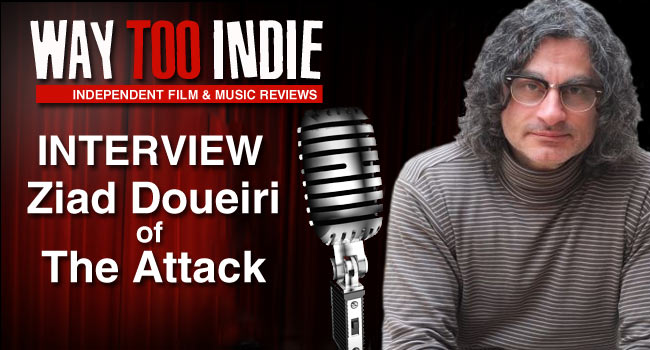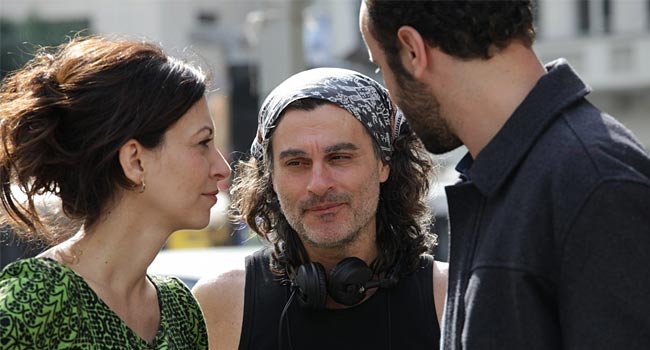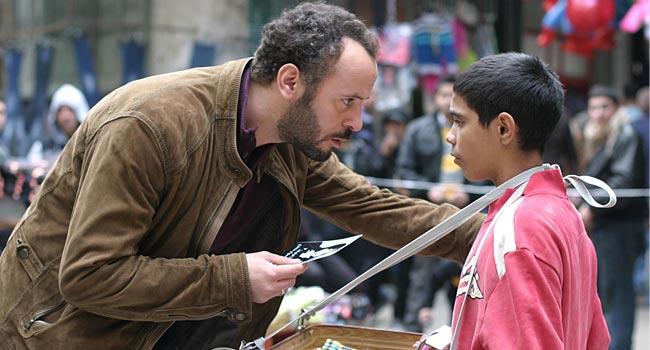Interview: Ziad Doueiri of The Attack

Writer-director Ziad Doueiri’s new film, The Attack (which I highly recommend), incurred a tidal wave of Arab anger when it was completed last year. By “tidal wave of Arab anger”, I mean this: the film has been banned in 22 Arab nations. It follows an accomplished Arab-Israeli surgeon (Ali Suliman) as he uncovers the truth behind the death of his wife, who took the lives of 19 innocents in a restaurant suicide bombing. The ban was enforced by the Arab League, who cited Doueiri’s collaboration with an Israeli film crew and the un-vilified representation of Israelis in the film as grounds for the massive embargo.
Though it’s been several months since the ban (which still stands), Doueiri’s frustrated rage about the subject hasn’t subsided. “Some Arabs are being assholes about it. That’s the truth. Is the problem that I was working with Jews? Fuck you.”
The Lebanese filmmaker (who worked as a cameraman for Quentin Tarantino for years) sat down with me to discuss the unfortunate imposition by the Arab League and detail the lengthy, arduous process of making the film, which almost didn’t see the light of day.
You’ve been traveling with the film for a while now. I assume, given the film’s setting, that you’ve been engaging in a lot of heated discussions about the Middle Eastern conflict, which I imagine might be taxing. That being said, has showing the film across the world been an enjoyable experience?
Showing the film is always the most joyful [experience.] It’s what matters in the end. It’s nice to see rooms that are filled up. Look…it’s been a very difficult experience. I didn’t think this film would ever be made. It was coming from a very dark place. The fact that it’s done really well…it helps. This is the law of the market: when a film makes money, it encourages people to want to invest again.
What have people’s reactions been to the film? Have they been focusing more on Amin’s story or your political observations?
Both. You can’t separate the two. Most people want to ask me about both. I have a tendency to get away from talking about the film because people are going to see the film, you understand? It’s more interesting to talk about other stuff. The process that went into making the movie, what was going on through my mind. This is what I prefer.
There’s a big story behind how the film got made. Take me to the very beginning.
I got a call from my agent in New York, and she said, “Focus Features is interested in doing a film with you. They have this book; do you want to read it?” I asked what it was about. She briefly told me the premise and I said, “I’m really not interested in doing something about the Middle East.” I just didn’t care about it. I thought, it’s an American company wanting to make a film about the Middle East. It’s certainly a very Orientalist view. I didn’t buy it. She said, “Just read the book.”
I read it, and it was a very powerful book. But, it was a challenge, because most of the book is written in first-person, with a voice talking. Half of the book is about Amin’s past. “I remember when…” How am I going to do this in a film? Lot’s of flashbacks? Voiceovers? Finally, we came up with the idea that the best way to do it was not with a voiceover, but to try to create scenes that are powerful enough that they allow the audience to remain in this guy’s head. We want to feel his pain, his agony, his anger.
I flew back to New York and met with the studio exec at that time. I told him, “This is how I want to do this movie” and he said OK. I went back to Beirut—this is 2006—and me and the co-screenwriter, Joelle Touma, began writing. Two weeks into writing, the Hezbollah-Israeli war started. We lived literally ten blocks from the Hezbollah headquarters. At a certain point, we wondered if it made any sense to do this movie. We felt like, who wants to see fiction when in reality there’s a real war going on that’s well-covered by the media? We had a lot of questions about the movie, but we signed a contract with Focus Features. We had to weigh our “no’s” before we really said “no.” We continued working, and nine months later we finished the script. I started to go to Tel Aviv to do the early preparation work—casting, location scouting—and the studio had second thoughts and pulled out.
Just like that?
Yeah. After they pulled out, we stayed for a long time, not knowing if this film would ever be made. I was involved in a negotiation with the studio to try to get the script back. They didn’t want to give it back. After three years, we got it back. We started from zero to try to finance the movie. That took another two years.
Was that the most difficult part of the process?
Yes. The whole thing I just told you. I was very frustrated by not being able to do a movie that I wrote. I believed I got the script to where it was very good. Somebody telling you, “No we can’t do it”…I just didn’t take it so good. Morally, it didn’t go down well. I was very upset the whole time. Then, I decided to call my career off. I said, “I’m done. I don’t want to work in films anymore.” Finally, we got the script back and we went and did the movie. There were other types of hardships—it was low-budget—but still…we made it.

You got some financial help from a few different countries, right?
We got some money from the Egyptians, the Qatar government, a little bit from France, and the Belgian government. The main party was the Arabs, who—after seeing the movie—pulled their name from the credits.
Why?
They thought that I showed the Israeli perspective too much, that I didn’t show the atrocities that the Israelis do to the Palestinians. They said, “That’s not fair” and we had a long debate. Finally, I said, “OK, take your name out.”
When you committed to this project, were you prepared to receive this kind of backlash?
You’re always prepared for some kinds of “no’s”, but not those. Those people gave us the money, gave us the OK, and changed their minds later. I was prepared, for example, that the Arab world would probably make a stink out of this film, but I didn’t expect the Arab league would be involved in stopping the movie in 22 Arab countries. It’s a political decision. This is not an artistic decision.
That must have been very upsetting…
The most upsetting! Still is! The whole world is seeing the movie. It’s doing extremely well in America. Why can’t the Arab world see it? The Arabs said, “You were unfair. You showed the Israeli victims as much as you showed the Palestinian victims”, which is all true, but…
When you’re preparing to make a film, do you watch other films for inspiration?
I don’t, but there are a couple of movies that I saw and affected me a lot, especially The Tree of Life.
Visually?
Yeah, visually. Tremendously. It really affected me a lot. I didn’t know what to do.
What do you mean
Well, there was a point when I went into pre-production seeing The Attack the way I saw The Tree of Life. I had to cut that thing, delete it from my head. I had to go back to my style.
You fell in love with it.
Tremendously. I saw it seven times in a row. It was a couple of months before shooting, and I was addicted to that movie. It was the way (Terrence Malick) shaped the story, the way he shot the film, the way he edited it—it’s a brilliant movie. It’s one of the most powerful movies I’ve ever seen. He really knows how to tell a story with a camera. He knows exactly where to place the camera and where to move it. He’s so lyrical with [his camera.]
Did you take certain techniques from his film and implement them in yours?
I was about to. I was seeing the movie shot in super wide angle the way he did in Tree of Life. I had to disconnect. If you’re making a movie because you’re influenced by another movie, you can screw up yours, because it’s someone else’s vision. We always get influenced by many movies, but Tree of Life in particular…I got addicted to it about a month before shooting. That’s dangerous. You have to go back to the way you see those images. I almost ruined the film. But look, I worked as a cameraman for a long time, so I knew how to go back to my instincts.
That’s what I was going to ask. How difficult was it to divorce yourself from that film, which you’d just fallen in love with
It took me a while, but I found my way. I kept reminding myself, “Go back to the way you wrote the film.” Usually, when I write, I see the scene how it’s shot. I see where the camera is. I had to go back to that. I’d written [the script] three years before I shot it. It’s not like I finished the script and immediately started location scouting. I wrote it in 2007 and finished shooting it in 2012.
What was it like revisiting the script after that arduous off period?
I improved it.
Did you make a lot of changes?
No, it was pretty much the same script. I made certain things tighter.
We touched on this earlier, but you said you wanted to convey Amin’s mental state visually, without voiceover. Was that challenging?
No, no. I knew…(trails off). Look—I don’t want to analyze it. It’s instinctual. It just comes. You see it. I knew when I was writing the scenes what music was going to work. I was listening to William Orbit, Moby, Brian Eno. These helped me shoot some of the scenes. I’d bring the music onto the set. It played an incredible factor in writing this film.
So the music informs the film to an extent.
Yes. This is how I like to work. I listen to music and the music brings me images. This is how a lot of the film was done. What was the original question?
It was about the challenge of putting the audience inside Amin’s head, visually.
Right. If I wanted to get inside his head, what if I filmed him from the back of his head, not just face-on all the time? I experimented: If you shoot somebody from behind the back, will it allow the audience to go inside his head more than if you shot them from the front? I started filming from the back, moving the steadycam with him wherever he went. Then, I threw a lot of things out of focus. If you’re with him, the focus is left on the background, not on him. I felt like, the fact that [his image] is soft shows that he’s in a contemplating state—a thinking mode. I think it worked.
Did you immediately recognize that this technique worked as you were shooting it?
Yes. I had it in my mind, and when I started shooting I started getting more ideas. “Let’s throw this more out of focus.”
What were you looking for when you were casting Amin?
When you’re casting, you’re looking for someone who can act, has the right look, and—most importantly—you have chemistry with. I’ve got to be able to get along with this guy. Is he defensive when you give instruction? Is he going to listen, or does he have an ego thing? If he’s a great actor, but we can’t get along, I won’t work with him.
Working with Ali was a peculiar story. He actually is a difficult guy. He’s dyslexic. He can’t read, and I didn’t know that until a month before we started shooting. I was worried because there was a lot of dialogue. I said, “How do you memorize stuff?” He said, “I scan.” I asked, “Can you memorize two pages?” He said, “Don’t worry about it.” Everything is “Don’t worry about it.” When [we started shooting] it was a catastrophe.

So you were looking for someone you had chemistry with…
I had chemistry [with Ali], but it broke. I started to get angry that he would come onto set not knowing his lines. But, he was a brilliant actor. That’s his strength.
Did you make sure he got all the lines?
Oh yes, of course. We just had to do 60 takes. But, he was brilliant as an actor, probably one of the best I’ve ever worked with. It was a very difficult role and he pulled it through. It was just very difficult to get [his performance right], because he can’t concentrate. These are details you don’t think about it when you see him on the screen. His performance is phenomenal. Getting there was a pain in the ass.
You filmed in Tel Aviv and in Palestine. Was it a good experience shooting in both places?
It was wonderful. There weren’t really any problems except that the Israeli Jews were not allowed to enter Palestine. Not by the Palestinian authorities, but by the Israeli authorities. So, we had to replace the crew and it created some logistical problems, but it’s fine. It’s all details. Nobody cares about those in the end. The film works.
It does. But, the fact that you filmed in the actual locations gives it authenticity.
We had to film in the real locations. We couldn’t build sets. I was looking at several cities—Nazareth, Yafo, Ramallah, Jerusalem—nothing looked like Nablus.
So you did look for some place that resembled Nablus.
I scouted for months and months. I found out that Nablus is a great looking town. It’s a tough town—not for me—and a very religious town. It’s fantastic. They helped us a lot.
Would you be opposed to the notion that the film is essentially a mystery movie?
It is. It is a detective movie. The interrogation scenes, a man on a quest. It has a thrilling aspect. At the same time, it has a political aspect and a romantic aspect. You see, you don’t always nail your script. I’m afraid on my next script I won’t be able to nail it. I felt I nailed this one.
But making the next film may be an easier process, no?
Nobody knows. There’s no such thing as an easy process. When you make a movie that does millions and millions at the box office, then you can call the shots. Producers say, “We can make money on this guy’s back.” My film is doing very well in the United States, but it’s not a mega blockbuster. It’s still a tough movie. It’s good enough that it got released.
